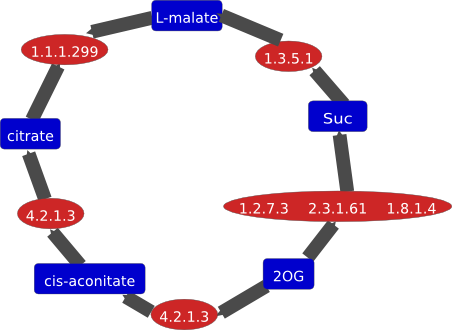EC Number   |
|---|
   3.2.2.30 3.2.2.30 | enzyme only or in complex with formycin A or adenine, hanging drop vapor diffusion method, using 0.1 M Tris pH 8.5 and 16% (w/v) polyethyleneglycol 8000, at 18°C |
   3.2.2.30 3.2.2.30 | hanging drop vapor diffusion method, mutants E14Q (0.1 M HEPES pH 7.5, 25% (w/v) PEG 3350, 0.2 M NaCl), D199N (0.1 M bis-Tris pH 5.5, 25% (w/v) PEG 3350, 0.2 M MgCl2-6H2O) and D199A (0.1 M bis-tris pH 6.5, 25% (w/v) PEG 3350, 0.2 M Li2SO4-H2O) |
   3.2.2.30 3.2.2.30 | hanging drop vapor diffusion method. Inactive D198N mutant bound to 5'-methylthioadenosine using 0.2 M magnesium chloride, 0.1 M HEPES (pH 7.5), and 25% (w/v) PEG 3350 |
   3.2.2.30 3.2.2.30 | structure of apoenzyme at 1.25 A, and five enzyme complexes with transition-state analogues at 1.42 to 1.95 A resolution. Inhibitor binding induces a loop movement to create a closed catalytic site with Asp196 and Ile152 providing purine leaving group activation and Arg192 and Glu12 activating the water nucleophile |
   3.2.2.30 3.2.2.30 | structures of wild-type cocrystallized with S-adenosylhomocysteine, formycin A, and (3R,4S)-4-(4-chlorophenylthiomethyl)-1-[(9-deazaadenin-9-yl)methyl]-3-hydroxypyrrolidine as well as one structure of inactive variant D198N cocrystallized with S-adenosylhomocysteine. Mechanism of D198 pKa elevation is through the sharing of a proton with atom N7 of the adenine moiety possessing unconventional hydrogen-bond geometry |
   3.2.2.30 3.2.2.30 | wild type and mutant enzymes E14Q, D199N, and D199A, sitting drop vapor diffusion method, using 4.0 M NaH2PO4/K2HPO4 pH 7.0 (wild type), 0.1 M HEPES pH 7.5, 25% PEG 3350, 0.2 M NaCl (E14Q), 0.1 M bis-Tris pH 5.5, 25% (w/v) PEG 3350, 0.2 M MgCl2-6H2O (D199N), and 0.1 M bis-Tris pH 6.5, 25% (w/v) PEG 3350, 0.2 M Li2SO4-H2O (D199A) |





